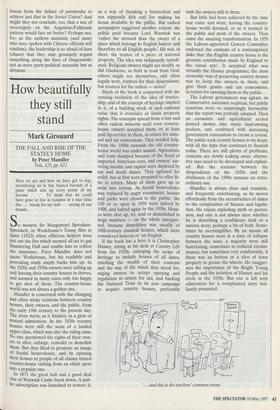The clash of software
Allan Mallinson
DRAGONSTRIKE: THE MILLENNIUM WAR by Humphrey Hawksley and Simon Holberton Sidgwick, £16.99, pp. 368 The editor of this magazine, writing in the Daily Telegraph recently, wondered what wars the Chiefs of Staff were predict- ing. The Chinese occupation of the South China Sea and invasion of Vietnam may not be one of them. Why should it be? Dragonstrike's authors explain:
Ten years after the collapse of the Soviet Union, another power bloc is emerging. It is wealthy. It is expansionist. It has yawning cultural differences with the West. It is embittered about its past. China is a non- democratic, one-party state, whose govern- ment has to prove itself to survive. This book has been written as a warning of what might happen if Western, and especially American, policy towards China is allowed to drift.
The authors are fresh from the fight, as it were. Humphrey Hawksley is the BBC's bureau chief in China. Simon Holberton is the former chief of the FT's Hong Kong bureau and before that the Tokyo corre- spondent for the Melbourne Age. Twenty years ago their publishers, Sidgwick and Jackson, produced another 'future history' — The Third World War — written by the retired general, and classics don, Sir John Hackett and other retired senior officers (and Norman Macrea). It described the course of a general war between Nato and the Warsaw Pact in the mid-1980s, its avowed intention being to warn against reducing defence expenditure in the face of the continuing Soviet military build-up. It was not an especially imaginative book. The scenario could have been taken from any Nato exercise of the time, and the details of the fighting from any post- exercise report. It portrayed a close-run thing which stopped just short of all-out nuclear war, although Birmingham was destroyed by an SS17 nuclear missile (and Minsk was destroyed in retaliation). The book's subtlety, however, was to paint a picture of near-defeat for a Nato with double its actual force-levels.
Dragonstrike is not aimed at military planners and is not packed with the mili- tary minutiae of The Third World War. Its canvas is the international process, before and during war. In Hackett's book we see the Clausewitzian nightmare of 'absolute' war, where military 'logic' drags policy in its wake. Hawksley and Holberton, how- ever, return to 'pure' Clausewitz, where war is not merely a political act but a politi- cal instrument — 'a continuation of politi- cal commerce, a carrying out of the same by other means'. After the absolutism which the Cold War threatened, and the cataclysmic or cathartic wars which have erupted since, this return to the notion of calculation in war is strangely chilling.
Dragonstrike's international and strategic insight is formidable. Its propositions are carefully referenced. The authors have cer- tainly done their homework — or, rather, they have got others to do it. We learn that 'Diplomats constructed the meetings within the Western governments' (though that much might have been inferred from the little conceit on page 176 — 'British policy on Operation Dragonstrike was being moulded by the brightest men in the Civil Service'). But who, one wonders, changed the status of the British high commission- ers in Australia, New Zealand and Brunei to ambassador? The acknowledgements are, in fact, as intriguing as they are exten- sive, for instance: 'Patricia Lewis made helpful comments on the design of the Japanese nuclear bomb.'
What is especially interesting in compar- ing Dragonstrike and Hackett's book is the enormous leap in war-fighting technology in 20 years. The Third World War was a clash of heavy metal. Dragonstrike is a war of software, of `C31' — command, control, communications and intelligence — and of weapons which are not so much smart as downright cunning. Surveillance is every- thing: the launch of HMS Vengeance's Trident D5 missiles could be detected by Chinese satellites 15 seconds before it happened, with an increased swell and generation of white water around the submerged submarine as the tor- pedo chamber doors opened.
But it is not just military software by which the running is made: CNN creates agendas (there was a New York joke that the 'situa- tion centre' in UN headquarters comprised nothing more than Fijian generals watching CNN); the financial markets are manipu- lated, as Clausewitz might have expected, and the Internet does its bit for peace.
The UN is marginalised (the veto again — not awfully clever of the Chinese in so calculated a war). ASEAN proves some- how toothless and the Asia Regional Forum does not get a mention. But the book's logic is all too plausible. The hope must therefore be that its premise is flawed, which is that
the overriding consideration for Chinese leaders [has] remained unchanged since Mao proclaimed the founding of the People's Republic in 1949: preservation of Communist Party rule.
Might they not instead, for instance, draw a lesson from the failure of perestroika to achieve just that in the Soviet Union? And might they not conclude, too, that a war of sovereignty on the Argentine/Falklands pattern would fare no better? Perhaps not, for, as the authors maintain (and many who have spoken with Chinese officials will confirm), the leadership is so afraid of luan (chaos) that they may genuinely regard something along the lines of Dragonstrike not as mere party-political necessity but as altruism.



































































 Previous page
Previous page